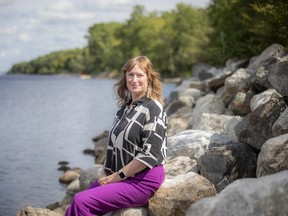Health
Ottawa Riverkeeper Calls for Increased Beach Water Testing

As the swimming season nears its end, the Ottawa Riverkeeper is advocating for more frequent water testing at urban beaches in Ottawa. The organization argues that increased testing is essential for ensuring public safety and accurately monitoring water quality. This call comes after the city announced earlier this year a reduction in testing frequency, shifting from daily to weekly assessments for E. coli.
According to a report released ahead of a board of health meeting on September 15, 2023, Ottawa Public Health (OPH) officials stated that the decision aligns with provincial standards and reflects practices adopted by most public health units across Ontario. The report highlighted that both Ottawa and Toronto are unique in conducting daily tests, while the majority of public health units test on a weekly basis. OPH officials noted that daily testing does not provide a reliable snapshot of water quality, as results are only available the following day, leading to potential misinterpretations by the public.
Throughout the period from 2014 to 2023, reported cases of waterborne illnesses in Ottawa have remained low. The report indicated that only 14 residents were confirmed to have illnesses likely traced to city beaches. Furthermore, epidemiological data showed that just four percent of waterborne illness cases involved swimming in Ontario lakes, rivers, or streams, with less than one percent linked specifically to Ottawa’s supervised beaches.
OPH officials emphasized the importance of long-term monitoring, stating, “Neither daily nor weekly testing methods reliably reflect real-time water conditions.” They believe that transitioning to weekly testing provides a sufficient overview of trends while allowing resources to focus on real-time risk communication regarding water safety.
Despite OPH’s rationale, Laura Reinsborough, CEO of Ottawa Riverkeeper, expressed surprise at the shift to weekly testing. Reinsborough pointed out that independent testing conducted by the organization shows an increase in E. coli levels at various beaches, indicating a decline in water quality. Specific sites, such as Petrie Island East Bay, face challenges due to lower water flow, often failing tests on multiple occasions.
“More frequent testing provides essential information,” Reinsborough stated. “For recreational sites like beaches, knowing whether it’s safe to swim is crucial. Regular updates can help track trends and inform necessary improvements.” She expressed concern that OPH’s decision to reduce water testing to the minimum required could undermine public health.
Reinsborough also highlighted the need for better communication from OPH regarding water quality testing. Just before the swimming season commenced, OPH announced the discontinuation of its flag system indicating water quality. Instead, the public is now encouraged to assess potential risks themselves, with water quality updates available online and through signage at the beaches. Reinsborough criticized this approach, stating that it places undue responsibility on the public to make informed decisions based solely on visual assessments.
Furthermore, she pointed out that the OPH website’s navigation for water quality results is cumbersome, requiring multiple clicks to access critical information. “There has been insufficient opportunity for the public to understand the new system,” she remarked, emphasizing the importance of clear and accessible communication.
OPH acknowledged in its report that improvements to its communication strategy are necessary. The agency aims to focus on water safety and promote informed decision-making for beachgoers. They collected feedback from various stakeholders, including the Ottawa Riverkeeper, to enhance future messaging.
As Ottawa Riverkeeper continues to advocate for more comprehensive testing, it remains crucial for public health officials to balance safety with effective communication. The call for increased beach water testing highlights the importance of transparency and responsiveness in maintaining the health of recreational waters for the community.
-

 Science3 months ago
Science3 months agoToyoake City Proposes Daily Two-Hour Smartphone Use Limit
-

 Top Stories3 months ago
Top Stories3 months agoPedestrian Fatally Injured in Esquimalt Collision on August 14
-

 Health3 months ago
Health3 months agoB.C. Review Reveals Urgent Need for Rare-Disease Drug Reforms
-

 Technology3 months ago
Technology3 months agoDark Adventure Game “Bye Sweet Carole” Set for October Release
-

 World3 months ago
World3 months agoJimmy Lai’s Defense Challenges Charges Under National Security Law
-

 Lifestyle3 months ago
Lifestyle3 months agoVictoria’s Pop-Up Shop Shines Light on B.C.’s Wolf Cull
-

 Technology3 months ago
Technology3 months agoKonami Revives Iconic Metal Gear Solid Delta Ahead of Release
-

 Technology3 months ago
Technology3 months agoApple Expands Self-Service Repair Program to Canada
-

 Technology3 months ago
Technology3 months agoSnapmaker U1 Color 3D Printer Redefines Speed and Sustainability
-

 Technology3 months ago
Technology3 months agoAION Folding Knife: Redefining EDC Design with Premium Materials
-

 Business3 months ago
Business3 months agoGordon Murray Automotive Unveils S1 LM and Le Mans GTR at Monterey
-

 Technology3 months ago
Technology3 months agoSolve Today’s Wordle Challenge: Hints and Answer for August 19









